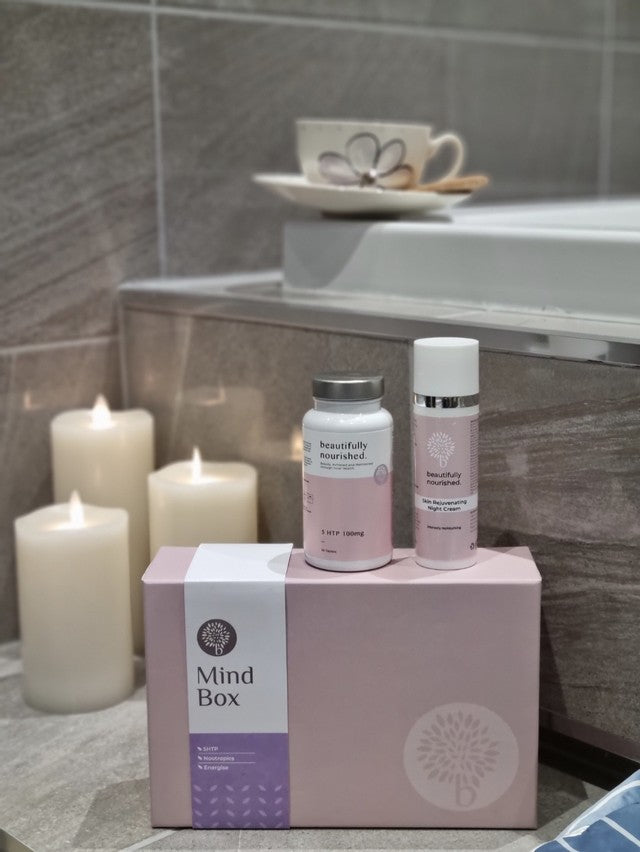
10 Signs of an Unhealthy Gut & How to Improve Gut Health Naturally
“When we eat, we are not just nourishing our body, we're feeding the trillions of microbes that live inside of our gut.”
— Tim Spector, King's College London
An incredibly Happy New Year to all of our readers. We hope you had a wonderful Holiday season and enjoyed the new year celebrations. Firstly, we want to thank you for taking the time to read our article, and secondly for showing up for your health!
10 Signs of an Unhealthy Gut & How to Improve Gut Health Naturally
During this article, we are going to be talking about gut health and the importance of keeping your gut healthy. We are going to discuss the best supplements to take and natural ways to improve your gut health too.
What is the Gut?
Our “gut” is our gastrointestinal (GI) tract that runs from the mouth to the anus, including all the organs of the digestive system. Food taken in through the mouth is digested to extract nutrients and absorb energy, and the waste expelled as faeces.
Our gut is a delicate ecosystem, with more flora (healthy bacteria) in it than all the other cells in the body put together. When this ecosystem is healthy, our digestive (GI) tract maintains balance of stomach acids and bacteria, allowing the body to breakdown food for nourishment and cell repair.
Leaky Gut Affects the Whole Body!
When the gut is “leaky” and bacteria and toxins enter the bloodstream, it can cause widespread inflammation and trigger a reaction from the immune system.
Gut Health Check
Do you have an unhealthy gut? Take the gut health test below:
- Chronic diarrhoea, constipation, gas, or bloating
- Nutritional deficiencies
- Poor immune system
- Headaches, brain fog, memory loss
- Excessive fatigue
- Skin rashes and problems such as acne, eczema or rosacea
- Cravings for sugar or carbs
- Arthritis or joint pain
- Depression, anxiety, stress
- Autoimmune diseases such as rheumatoid arthritis, lupus, celiac disease or Crohn's
There are approximately 100 trillion (1014) microbial cells living inside the human body, producing different proteins, synthetics, chemicals, and nutrients that can connect with other human cells. They inhabit every nook and cranny of our gastrointestinal tract and significantly influence our metabolism, body weight, our propensity to illness, immune systems, appetite, and mood.
Various research has been directed in recent years towards investigating how microbial living beings can fundamentally affect a person's overall wellbeing.
As per the research, the more extravagant and more assorted the local microorganisms are, the lower the danger of illness and hypersensitivities. Models from ongoing work at King's College London incorporate studies of diabetes, stoutness, sensitivity and infections like colitis and joint pain.
There is mounting proof that infants conceived through caesarean area pass up a portion of the microorganisms they would get through vaginal birth, making them more prone to hypersensitivities and asthma.
So how might we re-establish sound gut vegetation and diversify the microscopic organisms in our bodies and give the microbiome a reliable lift? Here are a few hints to get the gut moving.
Beautifully Nourished Recommendations for A Healthy Gut
Here at Beautifully Nourished, we have a whole supplement range to support gut health. The Gut Health collection features digestion supporting Detox and Fibre Pro supplements to support the gut microbiome and encourage healthy digestion.
Beautifully Nourished's Fibre Pro Supplement
Beautifully Nourished’s Fibre Pro has been designed to support the gut and encourage healthy digestion. Featuring Psyllium husk powder, Inulin powder and probiotic Lactobacillus Acidophilus, which helps to support a healthy and balanced gut bacterium.
The Benefits of Fibre
There is strong evidence to support that eating plenty of fibre is associated with a lower risk of heart disease, stroke, type 2 diabetes, and bowel cancer.
Fibre makes us feel fuller and a diet rich in fibre can help digestion and prevent constipation (NHS).
Other Fibre Benefits Include:
- Do fibre supplement help constipation? Yes
- Aids Healthy Digestion
- Supports Regular Bowel Movements
- Helps to Maintain Bowel Health
- Sustains Energy Levels
- Weight Management
- Fibre and Skin Health: As we all know, our diet and skin health are intricately linked. Although fibre is not the most obvious for this it can in fact cause breakouts if we do not eat enough. This is because fibre allows your body to release excess toxins and can help to clear up skin.
Beautifully Nourished's Detox Supplement
Beautifully Nourished’s Detox tablets aim to support the body's natural detoxification process as the body naturally cleanses toxins and impurities. It does this by providing key nutrients that can offset pollutants, neutralise free radicals and support digestive enzymes.
Beautifully Nourished’s Detox formula features vitamin C, which protects cells from oxidative stress, Aloe Vera, and Calcium, which contributes to the normal function of digestive enzymes.
The Benefits of Having the Right Gut Bacteria
Healthy bacteria work to fight off the bad bacteria and restore the balance within your body, making you feel better. Healthy bacteria keep you healthy by supporting your immune function and controlling inflammation. Taking a probiotic supplement have been linked to numerous health benefits, including:
- Weight loss
- Improved digestion
- Enhanced immune function
- Healthier skin
- Reduced risk of some diseases
Gut Health Restore
- Increase fibre consumption and consume 40g plus every day. Fibre intake can reduce the onset of coronary illness and disease as well as decreased weight gain.
- Diet rich in plant-based foods have been linked with the presence and abundance of certain gut microbes that are also associated with a lower risk of developing conditions such as obesity, Type 2 diabetes, and cardiovascular disease (Harvard-affiliated Massachusetts General Hospital (MGH)
- Eat, however, many kinds of foods grown from the ground as could be expected, and attempt to eat often.
- Pick high-fibre vegetables such as artichokes, leeks, onions, and garlic, which all contain undeniable degrees of inulin (a prebiotic fibre). A few vegetables like lettuce have little fibre or supplement esteem.
- Pick food and beverages with undeniable degrees of polyphenols. Polyphenols are cell reinforcements that go about as fuel for microorganisms. Models are nuts, seeds, berries, olive oil, brassicas, organic espresso, and tea – green tea.
- Likewise, an attempt to expand spans between suppers to give the microorganisms a rest. Periodically leave a longer than normal time between meals, this is known as intermittent fasting.
- Eat a lot of matured foods containing live microorganisms. Choices can include unsweetened yoghurt; kefir, which is an acrid milk drink with fivefold the number of organisms as yoghurt; crude milk cheeses; sauerkraut; kimchi, a Korean dish produced using garlic, cabbage, and bean stew; and soybean-based items, for example, soy sauce, tempeh and natto.
- Avoid synthetic sugars like aspartame, sucralose, and saccharine. These upset the digestion of organisms and decrease gut variety.
- Individuals living in rural territories have preferable microorganisms over city-tenants. In your free time, dust off from the grind: gardening and other open-air exercises are useful for our microbiome.
- Avoid anti-infection agents and superfluous medications where possible. Anti-microbials and antibiotics can annihilate both good and bad organisms, and it can require a long time to recuperate, so do not take them except if you need them. Over use is also connected with weight gain and sensitivities in humans. Even regular prescriptions such as paracetamol and acid neutralisers can interfere with microorganisms and gut flora balance.
- Use gentle shower gels and body washes. Overly astringent washing and abuse of antibacterial showers may not be useful for the gut.
- Consider the consumption of a probiotic with lactobacillus, as seen within both of Beautifully Nourished's Gut Health Detox, gut health weight loss and gut health Fibre Pro As featured in Health and Wellbeing Magazine.
- When to take probiotics: Consume on an empty stomach to make sure the healthy bacteria make it to the gut as quickly as possible. The best time to take a probiotic is either first thing in the morning before breakfast or before going to sleep at night. Consume with plenty of water.
Top Tips for Achieving Gut Health Naturally
Eat a diverse range of foods
- Eating a diverse diet rich in whole foods can lead to a diverse microbiome, which is beneficial for your health.
Eat lots of vegetables, legumes, beans, and fruit
- Fruits and vegetables are the best sources of nutrients for a healthy microbiome. They are high in fibre, which certain bacteria in your gut can digest and stimulate their growth.
Some high fibre foods that are good for your gut bacteria include:
- Beans and legumes
- raspberries
- artichokes
- green peas
- broccoli
- chickpeas
- lentils
- beans
- whole grains
- bananas
- Eat fermented foods
Eat Fermented Foods
Fermented foods have undergone fermentation, a process in which the sugars they contain are broken down by yeast or bacteria.
Some examples of fermented foods are:
- yogurt
- kimchi
- sauerkraut
- kefir
- kombucha
- tempeh
Eat prebiotic foods
Prebiotics are foods that promote the growth of beneficial bacteria in the gut.
They are fibre or complex carbs that human cells cannot digest. Instead, certain species of bacteria in the gut break them down and use them for fuel.
Many fruits, vegetables, and whole grains contain prebiotics, but they can also be found on their own.
Eat whole grains
Whole grains contain lots of fibre and non-digestible carbohydrates, such as beta-glucan. These carbohydrates are not absorbed in the small intestine and instead make their way to the large intestine to promote the growth of beneficial bacteria in the gut.
Eat a plant-based diet
A diverse plant based diet can yield a healthy and diverse gut microbiome. Several studies have shown that vegetarian diets may benefit the gut microbiome, which may be due to their high fibre content.
Eat foods rich in polyphenols
Polyphenols are plant compounds that have many health benefits, including reductions in blood pressure, inflammation, cholesterol levels, and oxidative stress.
Human cells cannot always digest polyphenols. Because they are not absorbed efficiently, most polyphenols make their way to the colon, where they are digested by gut bacteria.
Some examples of foods rich in polyphenols are:
- cocoa and dark chocolate
- red wine
- grape skins
- green tea
- almonds
- onions
- blueberries
- broccoli
4 Smoothies to Keep Your Gut Healthy
Cinnamon Berry Smoothie
Cinnamon can help break up intestinal gas, ease digestion, and improve glucose metabolism.
Ingredients
- 1 ½ cups dairy-free plant milk
- ½ avocado
- 1 cup kale
- 1 cup frozen berries
- ¼ teaspoon cinnamon
- 5 drops vanilla extract (optional)
Instructions
- Add ingredients to a blender, and blend until smooth.
Berry Flax Smoothie
Thanks to its fibre and omega-3 content, flax has long been used to relieve constipation and improve cardiac and digestive health. Berries and spinach add extra fibre and tons of prebiotic nutrients, while ginger helps settle the stomach.
Ingredients
- 1 ½ cups dairy-free plant milk
- ½ cup frozen or fresh berries
- 1 cup spinach
- 1 tablespoon flax seeds ground
- 1 teaspoon peeled ginger root
Instructions
- Place all ingredients in a blender. Blend until smooth.
The Green Smoothie
This green smoothie is packed with probiotics, greens, and aloe vera juice, which works wonders on the digestive system.
Ingredients
- ½ cup dairy-free plant milk
- ½ cup dairy-free kefir or dairy-free yogurt unsweetened
- 1 cup spinach or any leafy green
- 1 teaspoon cinnamon
- 1 teaspoon vanilla extract
- 1 ounce aloe vera juice
Instructions
- Add all ingredients to a blender. Blend until smooth, adding more cinnamon or vanilla if you like it sweeter.
Berry Beauty Smoothie
Keep your skin glowing and your digestion on track with this hydrating smoothie that is full of fibre and healthy fats.
Ingredients
- 1 ½ cups dairy-free plant milk or coconut water
- 1 cup romaine lettuce
- 1 cup kale
- ½ cup berries
- ½ avocado
Instructions
- Add all ingredients to a blender. Blend until smooth.
Why is Gut Health Important for Weight Loss?
"Your gut microbiome can help or cause resistance to weight loss and this opens up the possibility to try to alter the gut microbiome to impact weight loss," - lead study author Christian Diener, Ph.D.
Poor Gut Health Might Be the Reason You're Not Losing Weight!
Trust your gut. By that, we mean eating when you feel hungry and stopping when you feel full. Taking a mindful approach to eating that does not include restricting the foods you eat. It is crucial to support your gut bacteria. The good bugs in our gut have a direct impact on our ability to lose weight. Eat plenty of soluble fibre, avoid foods that contain trans fats, eat a high protein diet and do aerobic exercise.
Improving digestive health can result in weight loss and weight management. Regular bowel movements, the appropriate elimination of waste and correct nutrient absorption can impact body mass and fat reserves.
Intermittent fasting can be a great way to give your gut a break.
The Link Between Digestion and your Skin
Many inflammatory skin conditions have been linked to disruptions in gut microbes, including acne, rosacea, and eczema psoriasis. While poor gut health is unlikely to be the sole cause of the development of acne, digestive issues are more common in those with acne than those without. If you have a skin condition it might be worth trying to increase your intake of prebiotic foods and taking a Beautifully Nourished supplement from our gut health range.
The Mind-Gut Connection
All of us have a gut feeling or butterflies in our stomach at some point. The sensations exuding from our tummy propose that our cerebrum and gut are associated in one or another way.
Additionally, ongoing examinations show that the mind influences gut wellbeing, and our gut may even affect our cerebrum wellbeing. So, in one way, both are somewhere interconnected. The correspondence framework between the gut and cerebrum is known as the gut-mind hub.
Below, we discuss the gut-cerebrum pivot and food sources that are helpful to its wellbeing.
The two organs-mind and the gut are associated both indeed and biochemically in various manners.
Our gut and cerebrum are associated indeed through many nerves, particularly the Vagus nerve. The gut and its microorganisms additionally control aggravation and make various mixtures that can influence cerebrum wellbeing.
Probiotics, Prebiotics, and the Gut-Brain Axis
Gut microscopic organisms influence cerebrum wellbeing, so changing our gut microbes may improve our mind wellbeing.
Probiotics are live microbes that give medical advantages whenever eaten.
Prebiotics, which are ordinarily strands that are matured by our gut microorganisms, may likewise influence mind-being.
Studies found that taking a prebiotic called galactooligosaccharides for three weeks fundamentally decreased the body's stress chemical measure, called cortisol.
Probiotics that influence the cerebrum are likewise called psych biotics. The two probiotics and prebiotics have been appeared to lessen levels of uneasiness, stress, and melancholy.
What Foods Help the Gut-Brain Axis?
A couple of gatherings of foods are explicitly useful for the gut-cerebrum pivot.
Various food sources like sleek fish, aged food sources and high-fibre food sources may help increment the advantageous microorganisms in our gut and improve cerebrum wellbeing.
Here are the absolute most significant ones:
Omega-3 fats: These fats are found in sleek fish and excessive amounts in the human cerebrum. Studies in people and creatures show that omega-3s can build great microorganisms in the gut and diminish the danger of mind issues.
Matured nourishment's: Yogurt, kefir, sauerkraut, and cheddar all contain sound organisms like lactic corrosive microbes. Matured food sources have been appeared to modify the action.
High-fibre food sources: Whole grains, nuts, seeds, products of the soil all contain prebiotic strands that are useful for your gut microscopic organisms. Prebiotics can decrease stress chemical in people.
Polyphenol-rich nourishment's: Cocoa, green tea, olive oil and espresso all contain polyphenols, which are synthetic plant compounds nourishing for our gut microbes. Polyphenols increment good gut microscopic organisms and may improve comprehensions.
Tryptophan-rich food sources: Tryptophan is an amino corrosive that is changed over into the synapse serotonin. Nourishment's that are high in tryptophan incorporate turkey, eggs, and cheddar.
Summary
A healthy gut contributes to a strong immune system, heart health, brain health, improved mood, healthy sleep, and effective digestion, and it may help prevent some cancers and autoimmune diseases.
Whole grains, fruits, vegetables, and fermented foods all support healthy gut bacteria, while too many sugary foods, artificial sweeteners and unhealthy fats can be bad for your gut bacteria.
Taking a supplement from our gut health selection range will also help support the gut microbiome and encourage healthy digestion.
The top 5 tips to a healthy gut:
- Eat more probiotics
- Then follow up with prebiotics
- Fill up on fermented foods
- Consume less red meat
- Limit processed foods
Follow us on Instagram @officalbeautifullynourished to keep up to date with nutritional remedies and health inspiration.







Leave a comment
This site is protected by hCaptcha and the hCaptcha Privacy Policy and Terms of Service apply.